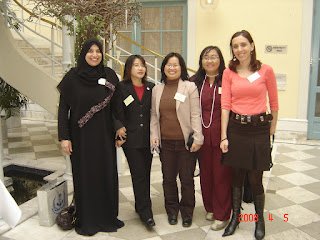 |
INTRODUCTION
The Association of South-East Asia Nations or ASEAN is a regional
cooperation organization in the dynamic region of South East Asia, established
in 8 August 1967 and comprises of 10
nations namely Brunei Darussalam, Cambodia,
Indonesia, Lao PDR, Malaysia, Myanmar,
the Philippines, Singapore, Thailand,
and Vietnam.
Initially, the Organization established by five nations of Indonesia, Malaysia,
the Philippines, Singapore and Thailand, later Brunei Darussalam, Vietnam, Lao
PDR, Myanmar and Cambodia joined the
group. The important role of ASEAN for its region is not only by creating
stability and peace, but also in its 41
years of establishment, ASEAN has proven its self as one of an important moving
engine for the economic development in its member states to realized the
prosperity of the people of South East Asia
region.
 | ||||
| The Speakers: WMU Class of 2004 |
In the area of economy cooperation, an efficient and integrated
transport system is a key for ASEAN to integrate with the global economy,
improve competitiveness and enhance the inflow of foreign direct investment.
Therefore, ASEAN Transport Cooperation is directed to intensify regional
activities to enhance multimodal transport linkages and interconnectivity,
promote the seamless movement of peoples and goods, promote further
liberalization in the air and maritime transport services, and further improve
integration and efficiency of transport services and the supporting logistics
systems. Furthermore, the cooperation is also hoped to give a significant
contribution to make a solid foundation for ASEAN economic integration
internally. One of a vital part of that integration is by linking ASEAN
economies and societies more closely and strongly together by building,
upgrading and improving transport networks among ASEAN member countries, making
them work better and less expensively. A good and efficient transport makes
contact between people quicker and smoother.
COACHING IN ASEAN TRANSPORT COOPERATION
 |
In order to develop South East
Asia to become a strong economy region, ASEAN member states has to support each others in the process, considering
their different economic development. In this regard, countries which are more
developed, couching or assisting countries less developed, through capacity
building and share of knowledge. This two activities are greatly important and
become a common practices, so that ASEAN member countries could achieve the
equal level of development.
In ASEAN transport cooperation, these practices have
been proven to be highly effective. It could be seen in the significant
development in transportation capability of ASEAN member countries particularly
for the countries which joining ASEAN in
a latter stage. Presently, instead of their equal right as a ASEAN
member countries, their capability have greatly improved so that they could
cooperate better as a member of ASEAN. Coaching
in ASEAN transport cooperation also conducted
by ASEAN dialogue partners for ASEAN member countries. In the
transportation sector, ASEAN has established cooperation with Japan
and China.
ASEAN cooperation with these two countries are conducted in ministerial as well as senior officials
levels. Under this cooperation, several capacity building and share of
knowledge between ASEAN and its dialogue partner are also established.
In order to establish integration among its member
states, ASEAN transport cooperation has to through a lengthy negotiation to
establish several framework agreement which create rules in transportation sector which shall be
followed by its member countries. Due to a different domestic policy of its
member countries in the implementation of ASEAN transport agreement, therefore
ASEAN has established a scheme called ASEAN minus X Formula. If one or two
member countries are ready for the implementation of the agreement, they could
firstly proceed and others member
countries could follow later when they are ready. This formula is established
to facilitate countries that need more time to implement ASEAN policy, without
preventing others which are ready to implement.
NETWORKING IN ASEAN TRANSPORT COOPERATION
Networking in ASEAN transport cooperation is
conducted through physical network and electronic one. The physical network is
done with regular meeting among its member countries as well as with its
dialogue partner. The meetings are ministerial, senior officials, working group
and sub-working group levels. ASEAN Transport Ministers (ATM) Meeting
is a meeting of ASEAN transport ministers and also with minister of
transport of their dialogue partners, conducted
every year. ASEAN Senior Transport Officials Meeting (STOM) is done twice a year. The senior
officials meeting report to the ministerial meeting to seek for guidance and for
adoption of their works. In the working group level, ASEAN has four working
group namely, ASEAN Land Transport Working Group (LTWG), ASEAN Maritime
Transport Working Group (MTWG), ASEAN Air Transport Working Group (ATWG) and
ASEAN Transport Facilitation Working Group (TFWG). These working groups are
usually met twice a year before the Senior Transport Officials Meeting or as
decided by the decision of the working group meeting. ASEAN Highway Sub Working
Group Meeting is the sub working group under ASEAN Land Transport Working
Group. Usually this meeting are conducted back to back with its parent working group or as decided by the
meeting.
Aside of physical networking, ASEAN transport
cooperation also has electronical network through email. They have established
email network to make a communication to each other member states. In this
regard, ASEAN Secretariat is playing its role in spreading the information especially prior to a meeting or to seek
consultation on a certain matters which need
concurrent from a member states. In this way of communication, ASEAN
member countries have appoint contact person and email address. ASEAN member
countries also could directly communicate with each others by sending email to every member states.
CONCLUSION
 |
| The Speakers at lunch break |
( Note: This Short writing was submitted to the Seminar on " Empowering Professional Women in the Maritime World" held in Malmo, Sweden on 2-4 April 2008)
Tidak ada komentar:
Posting Komentar